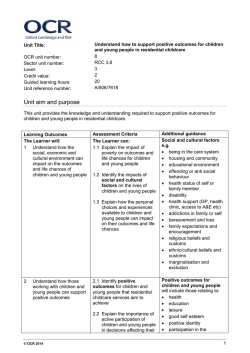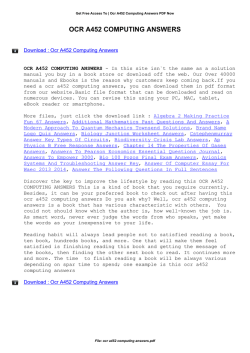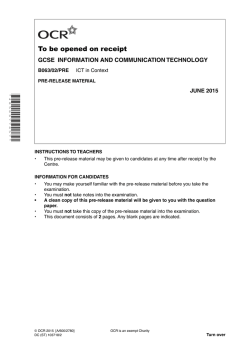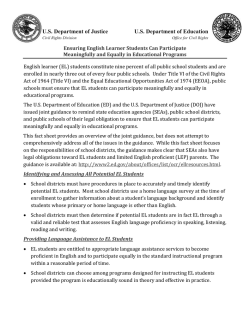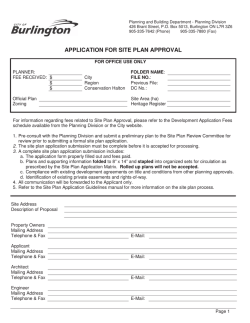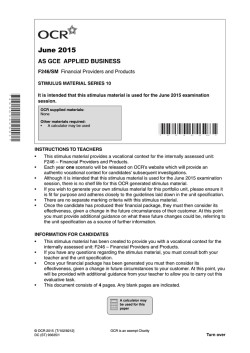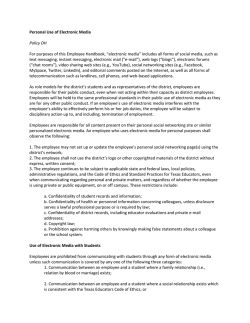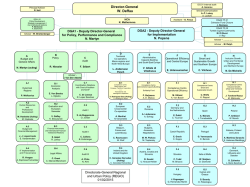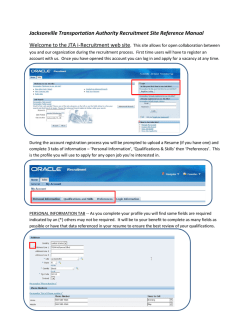
RCC 3.4 Promote effective communication and information
Unit Title: OCR unit number: Sector unit number: Level: Credit value: Guided learning hours: Unit reference number: Promote effective communication and information handling in residential childcare settings 4 RCC 3.4 3 3 21 A/506/8526 Unit aim and purpose This unit provides the knowledge and skills required to promote effective communication and information handling in residential childcare settings. Learning Outcomes The Learner will: 1 Understand effective communication in the work setting Assessment Criteria The Learner can: 1.1 Explain the reasons why people communicate Additional guidance 1.2 Describe factors to consider for effective communication 1.3 Analyse reasons why in a particular situation a child or young person may be unable to use verbal communication 1.4 Explain how communication affects relationships and effective practice in own work 2 Be able to meet the communication and language needs, wishes and preferences of individual children and young people 2.1 Establish the communication and language needs, wishes and preferences of a child or young person 2.2 Use communication methods and aids to meet the individual needs of children or young people 2.3 Explain how children and young people use communication methods in different ways © OCR 2014 Communication methods and aids may include: Verbal Non-verbal Sign Pictorial Written Electronic/technological Assisted 1 Learning Outcomes Assessment Criteria Additional guidance 2.4 Respond to children or young people’s reactions while communicating with them 3 Be able to reduce barriers to communication in residential childcare settings 3.1 Describe barriers to communication and their impact 3.2 Reduce barriers to communication 3.3 Adapt communication to resolve misunderstandings 3.4 Explain how to access support or services to enable a child or young person to communicate effectively Services may include: translation services 4 5 6 Be able to use communication skills to deescalate situations of tension or conflict Understand principles and practices relating to confidentiality in own work Be able to implement organisational processes and procedures for recording, storing and sharing information interpreting services speech and language services advocacy services 4.1 Use verbal and non-verbal communication skills to deescalate a situation of tension or conflict 4.2 Use reflective practice to review the impact of own communication in situations of tension or conflict 5.1 Explain the term ‘confidentiality’ 5.2 Explain the conflict between maintaining confidentiality and disclosing concerns 5.3 Explain the boundaries of own role and responsibilities in relation to confidentiality and disclosure 6.1 Contribute to the implementation of organisational processes and procedures for recording, storing and sharing information 6.2 Apply confidentiality in day to day communication, in line with policies and procedures 2 © OCR 2014 Learning Outcomes Assessment Criteria Additional guidance 6.3 Maintain data in line with policies and procedures that underpin integrated and multi- agency working Assessment This unit must be assessed in accordance with Skills for Care and Development's QCF Assessment Principles. Assessment decisions for competence based learning outcomes (e.g. those beginning with ‘Be able to’) must be made in a real work environment by an occupationally competent assessor. Any knowledge evidence integral to these learning outcomes may be generated outside of the work environment but the final assessment decision must be within the real work environment. This unit is competence based. This means that it is linked to the candidate's ability to competently perform a range of tasks connected with their work. This unit may be assessed using any method, or combination of methods, which clearly demonstrates that the learning outcomes and assessment criteria have been met. This unit requires workplace assessment of occupational competence. Competence based assessment must include direct observation as the main source of evidence. National Occupational Standards (NOS) mapping/signposting This unit has been developed by Skills for Care and Development in Partnership with Awarding Organisations. It is a requirement for new staff working in residential childcare to be working towards these qualifications from 01/01/15. It is directly relevant to the needs of employers and relates to national occupational standards developed by Skills for Care and Development. As such, the unit may provide evidence for SCDHSC0031. Functional skills signposting This section indicates where candidates may have an opportunity to develop their functional skills. Functional Skills Standards English Speaking and Listening Reading Writing X Mathematics Representing X Analysing X Interpreting ICT Use ICT systems Find and select information Develop, present and communicate information Additional information We do not stipulate the mode of delivery for the teaching of the content of this unit. Centres are free to deliver this unit using any mode of delivery that meets the needs of their candidates. Centres should consider the candidates’ complete learning experience when designing learning programmes. © OCR 2014 3 The Centre Handbook contains important information for anyone delivering this unit which is part of the residential childcare qualifications. For further information regarding administration for this qualification, please refer to the OCR document ‘Admin Guide: Vocational Qualifications’ on our website www.ocr.org.uk . 4 © OCR 2014
© Copyright 2026
